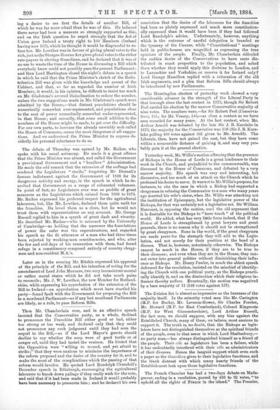Then Mr. Chamberlain rose, and in an effective speech insisted
that the Conservative party, as a whole, declined to pronounce the Franchise Bill either good or bad, either too strong or too weak, and declared only that they could not pronounce any such judgment until they had seen the sequel to the Bill,—as if the Lord Mayor's guests should decline to say whether the soup were of good turtle or of conger eel, until they bad tasted the venison. He hinted that the Opposition were "willing to wound, and yet afraid to strike ;" that they were anxious to minimise the importance of the reform proposed and the desire of the country for it, and to make the most of the complications which the passing of that reform would involve. He quoted Lord Randolph Churchill's December speech in Edinburgh, encouraging the agricultural labourers to knock down palings if they really wish for the vote, and said that if it had been made in Ireland it would probably have been necessary to prosecute him ; and he declared his own conviction that the desire of the labourers for the franchise had been as plainly expressed and much more constitution- ally expressed than it would have been if they had followed Lord Randolph's advice. Unfortunately, however, anything which is the outcome of careful delegation is branded as the tyranny of the Caucus, while " Constitutional " meetings held in public-houses are magnified as expressing the true opinions of the people. Finally, Mr. Chamberlain ridiculed the sudden desire of the Conservatives to have seats dis- tributed in exact proportion to the population, and asked them whether they would apply this doctrine to London, and to Lancashire and Yorkshire, or reserve it for Ireland only ? Lord George Hamilton replied with a reiteration of the old Irish arguments, and a plea that Reform Bills should always be introduced by new Parliaments.


































 Previous page
Previous page